‘Tis the season for delicious holiday baking! From traditional and timeless recipes to new concoctions in the kitchen, chances are you’ll be using some type of flour to cook or bake with. However, if you have kidney disease you may be wondering if flour is okay to use for kidney disease. And if so, what is the best flour for kidney disease? We answer all of your questions here as well as break down the full list of the best flours for kidney disease. On your marks, get set, and bake! (Any Great British Baking Show fans here?)

Table of Contents
Different Types of Flour and How To Use Them
Let’s start with the full list of flours available for use. There are so many flours out there.
If you have ever walked through the baking section at a health foods store (or really any grocery store nowadays) you’ve likely seen a few of these flours and wondered what they were and how to use them.
Below is a table of many varieties of flour, along with the best uses for them.
| Types of Flour | Best Uses |
|---|---|
| All-Purpose flour | Pie crusts, biscuits, bread. Very versatile! |
| Whole wheat flour | Heavy and dense baked goods such as bread or some cookies |
| Almond flour | Bread, cookies, or a gluten-free substitution |
| Coconut flour | Bread, cookies, brownies |
| Oat flour | Gluten-free baking substitute, quick bread, and cookies |
| Rice flour | Gluten-free cooking, steaming, frying, or in sweets like mochi |
| Chickpea flour | Flatbreads, pancakes, or chickpea omelets (can be used as a kidney-friendly omelet substitute) |
| Pastry flour | Pies, tarts, croissants, and many types of cookies |
| Cake flour | Biscuits, muffins, cakes, or scones. |
| Potato flour | Gluten-free cooking, sauces, or soups |
Some of these are pretty common flours, but are there any on this list that are new to you?
How to Determine the Best Flour for Kidney Disease
There are so many different types flours available. But what determines if a certain flour is good for kidney disease?
We want to consider:
Nutrient density
Does the flour that you chose have a lot of healthful vitamins and minerals (i.e B vitamins, Iron, Magnesium, etc)?
Whole grain and whole wheat flour can be very nutrient-dense options!
Fiber
Ideally, the flour that we use will contain fiber, which is a nutrient that can contribute to better heart health, gastrointestinal health, and better blood sugar control.
Fiber-rich flours include:
- Chickpea flour
- Oat flour
- Whole wheat flour
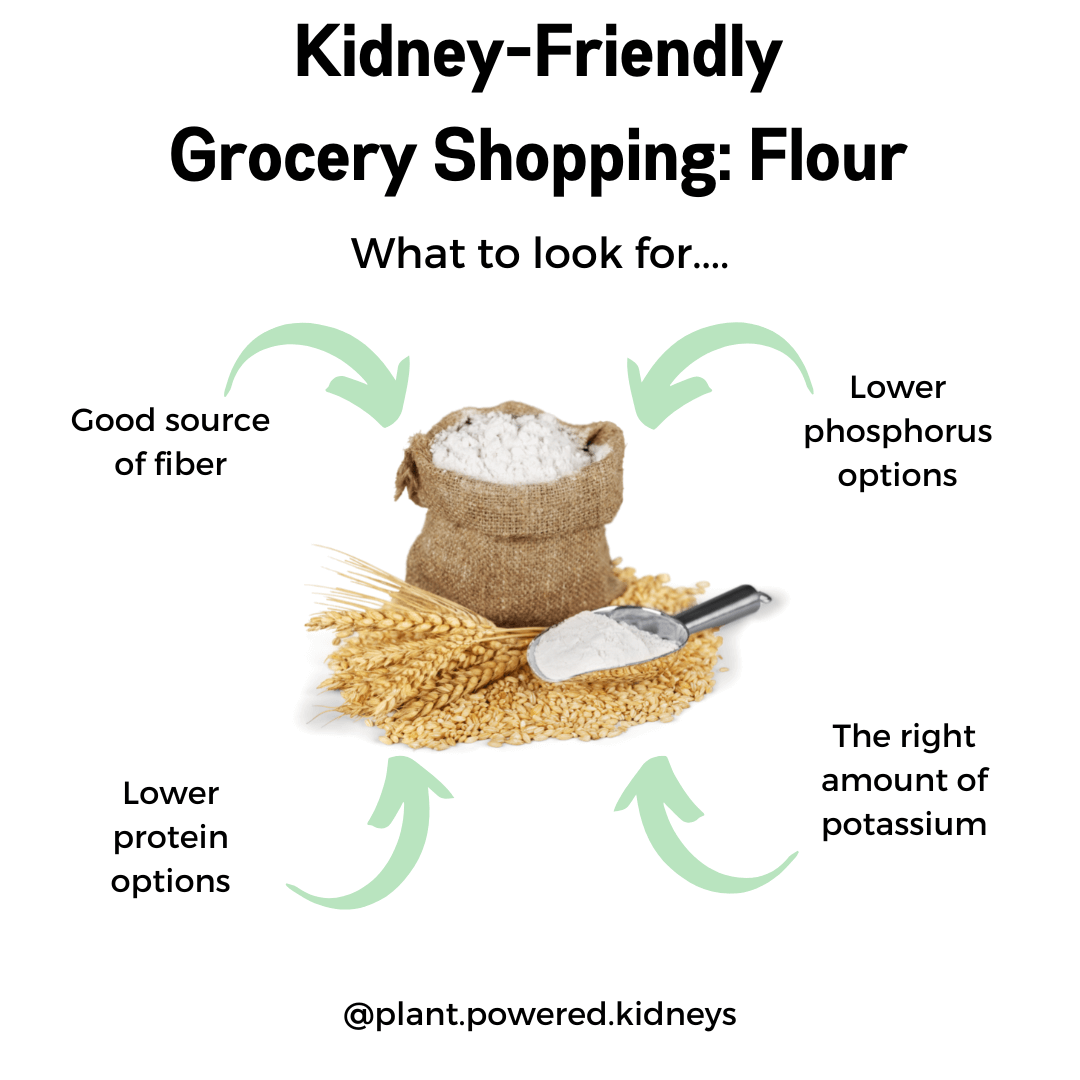
Protein content
Many flours do contain protein. This is something that you’ll have to consider when choosing the best flour.
Flours that are low in protein include:
- Brown rice flour
- Yellow corn flour
- Potato flour
Potassium
Some people with kidney disease may need to limit the amount of potassium that they consume.
If you do, choosing a lower-potassium flour may be helpful.
Remember, not everyone with kidney disease needs to follow a low-potassium diet.
Low-potassium flour options include:
- White, all-purpose flour
- White rice flour
- Yellow corn flour
Potato flour has a lot of potassium compared to other flour.
It may be helpful to swap out potato flour for a lower-potassium flour if you have trouble sticking to your potassium limit.
Phosphorus
Certain types of flour can contain high amounts of phosphorus.
Low phosphorus flour options include:
- White, all-purpose flour
- White rice flour
- Yellow corn flour
Taste
The flour you use needs to taste good! There is no reason why a kidney-friendly diet (or a kidney-friendly baked good) shouldn’t taste good!
Nutritional Comparison of Different Flours
Below is a table listing out many different flour options. Nutritional considerations related to kidney health are also listed to help you compare them side-by-side.
| Type of Flour Per 100g | Protein (g) | Fiber (g) | Phosphorus (mg) | Potassium(mg) | Iron(mg) | Magnesium(mg) |
|---|---|---|---|---|---|---|
| White, All-Purpose Flour | 10 | 3 | 108 | 107 | 5 | 22 |
| Gluten-free, All-Purpose Flour | 7 | 0 | unavailable | unavailable | 5 | unavailable |
| Whole Wheat Flour | 15 | 11 | 352 | 376 | 4 | 136 |
| Chickpea Flour | 22 | 11 | 318 | 846 | 5 | 166 |
| Coconut Flour | 19 | 38 | unavailable | 544 | 3 | unavailable |
| Almond Flour | 26 | 9 | 512 | 667 | 3 | 251 |
| Oat Flour | 13 | 11 | 372 | 373 | 4 | 125 |
| Potato Flour | 8 | 5 | 197 | 1270 | 12 | 74 |
| Brown Rice Flour | 7 | unavailable | 319 | 265 | 2 | 124 |
| White Rice Flour | 7 | 1 | 94 | 75 | <1 | 23 |
| Yellow Corn Flour | 6 | 4 | 92 | 144 | 4 | 30 |
| Pastry Flour | 9 | unavailable | 102 | 142 | 1 | 22 |
| Cake Flour | 8 | 2 | 85 | 105 | 7 | 16 |
All of the above information was gathered from the USDA nutrient database. Nutrition information for individual products and manufacturers may vary.
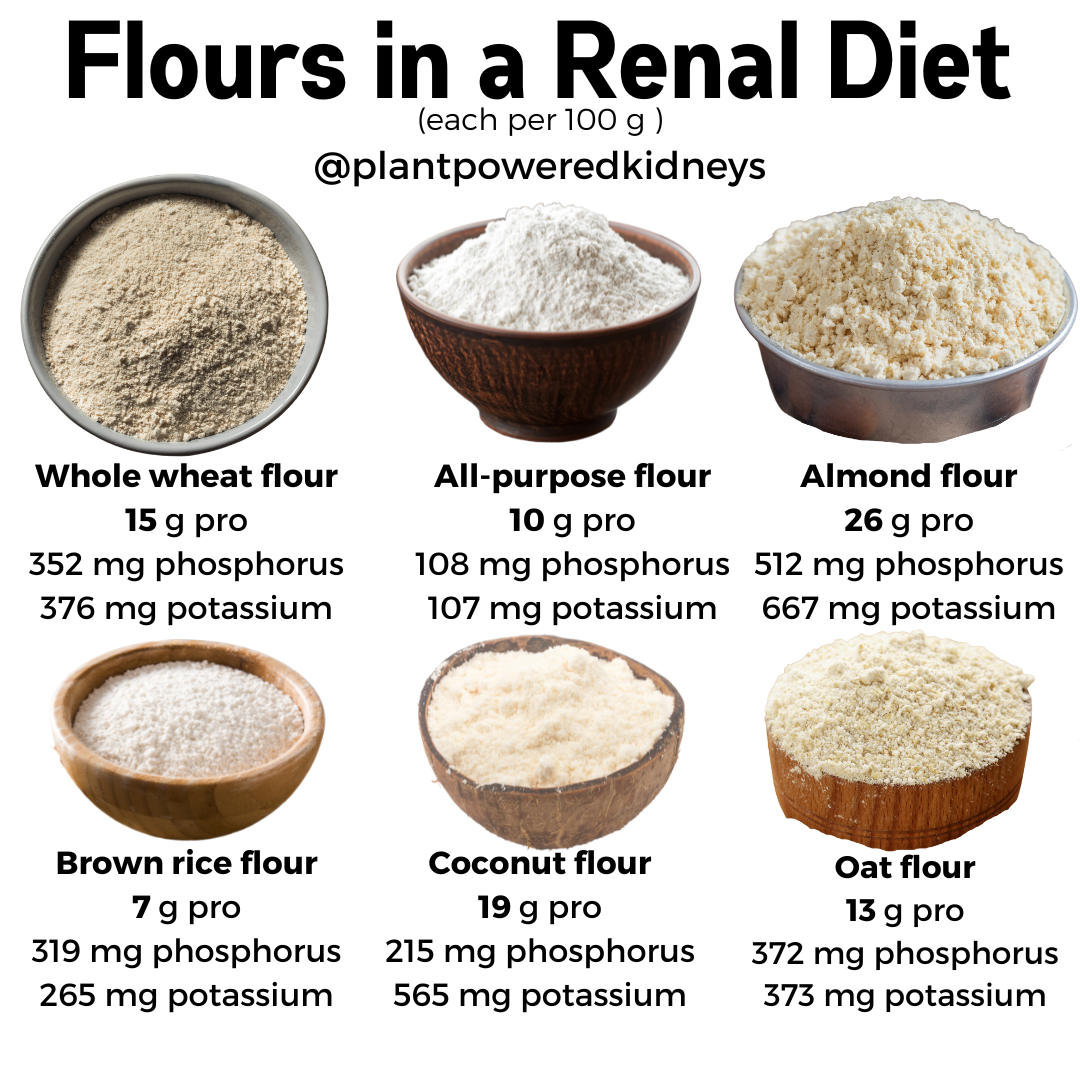
The Best Flour for Kidney Disease
So which one is the best flour for kidney disease? Some of our favorites include:
- White, all-purpose flour
- Whole wheat flour
- White rice flour
- Brown rice flour
- Yellow corn flour
- Oat flour
These flours typically have moderate amounts of protein, phosphorus, and potassium and contain fiber!
Does that mean that the other types of flour should not be included in the kidney-friendly diet? Certainly not!
It may just mean that some types of flour need to be used in smaller amounts.
For example, almond flour and chickpea flour are two very popular flours right now.
However, they do contain high amounts of protein compared to all-purpose flour or brown rice flour.
If you need to limit the amount of protein in your diet, you may need to use a smaller amount of almond or chickpea flour or swap out your flour for a lower protein option.
As always, it’s all about balance!
The Whole Grain Dilemma
Have you ever been told that you shouldn’t have whole grains on a kidney diet?
This is an older kidney diet recommendation that is very outdated. However, we still hear it being recommended to kidney patients.
We know that whole grains can and should be a part of your kidney-friendly diet.
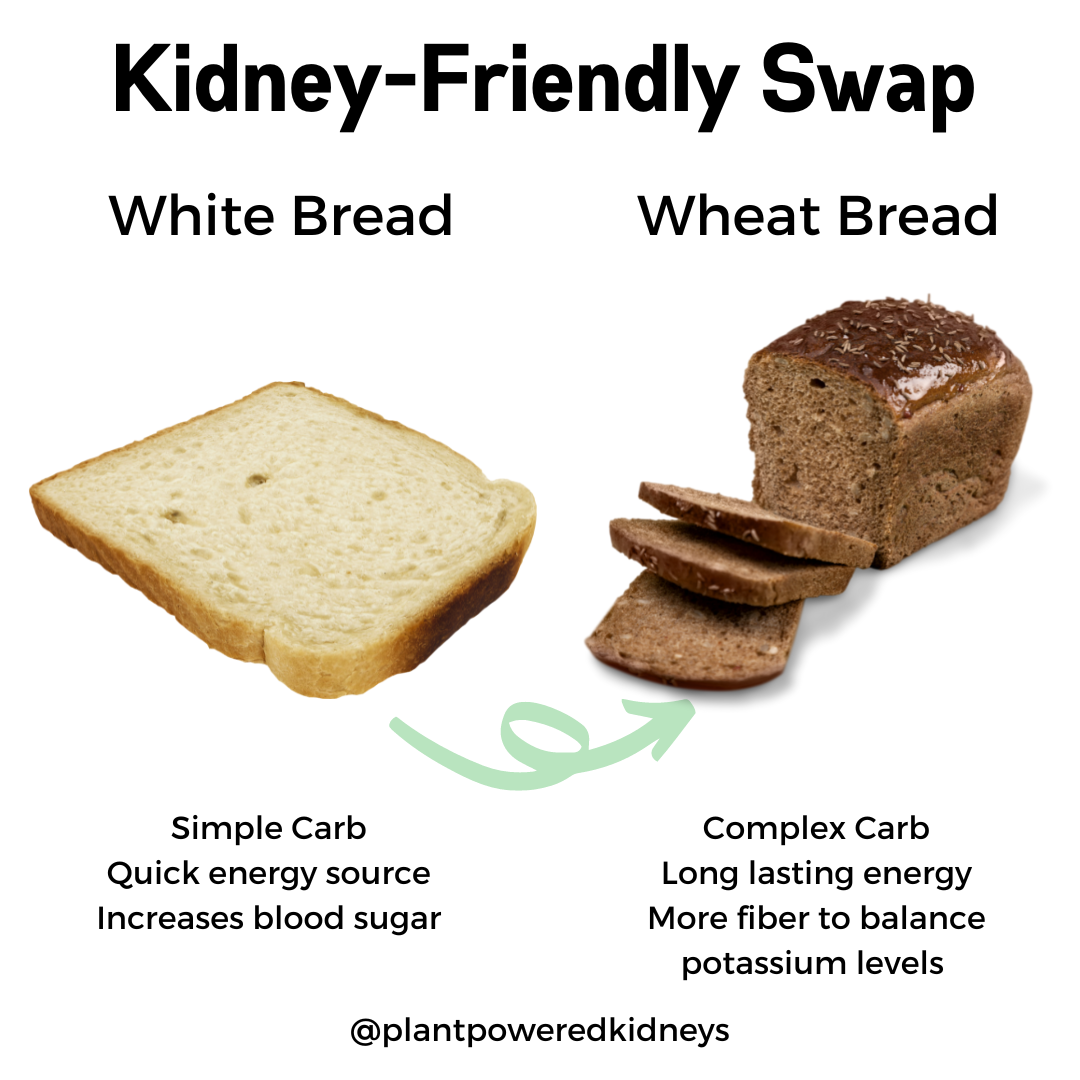
Whole grains are much more nutrient dense compared to white flour.
This means that whole grains have more fiber, B vitamins, magnesium, and more healthful nutrients!
All of these nutrients can help contribute to a more balanced and well-rounded kidney diet.
Therefore, whole grain and whole wheat flour can be an excellent addition to a kidney-friendly diet!
What about the phosphorus and protein in whole grains?
On the other hand, the whole-grain version contains more protein.
This can help you stay fuller for longer, however many people with kidney disease need to limit the amount of protein they consume.
The whole-grain version of flour also usually contains more phosphorus than the white version.
However, we know now that the type of phosphorus found in whole grain is only absorbed by about 30% in our bodies.
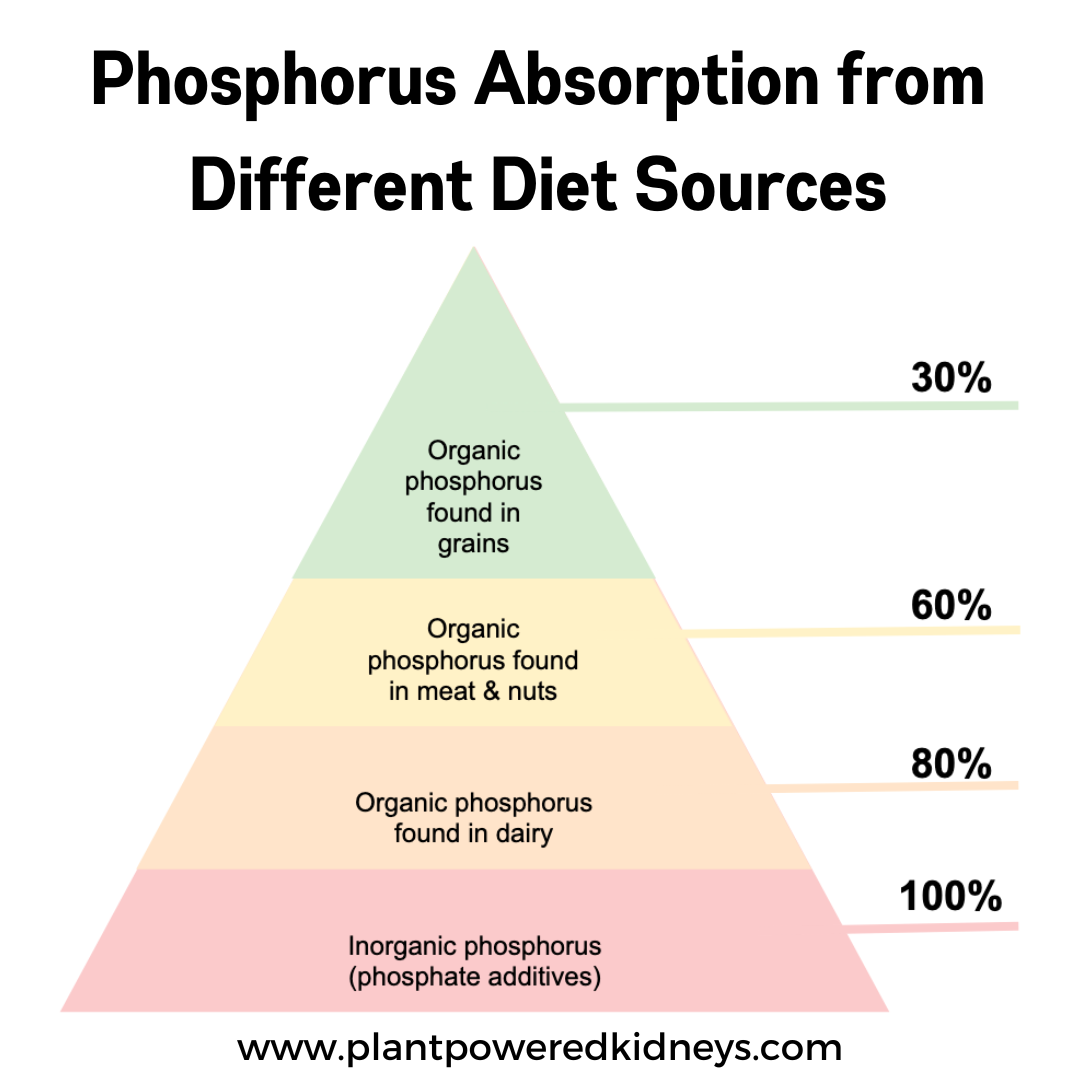
Best Flour for Diabetics
If you have kidney disease and diabetes, it may seem like your options are pretty limited.
However, there are still some great flour options available that can keep blood sugars under control and keep your kidneys healthy!
Let’s compare some of the most common flours that are recommended for those with diabetes:
| Type of Flour (per 100 g) | Carbohydrates (g) | Fiber (g) | Protein (g) |
|---|---|---|---|
| Almond Flour | 16 | 9 | 26 |
| Coconut Flour | 62 | 40 | 16 |
| Chickpea Flour | 58 | 12 | 22 |
| Oat Flour | 70 | 12 | 14 |
| Whole wheat flour | 71 | 11 | 15 |
All of the above information was gathered from the USDA nutrient database. Nutrition information for individual products and manufacturers may vary.
From the list above, our favorite kidney-friendly and diabetes-friendly options include:
- Whole wheat flour
- Coconut flour *higher in potassium
- Oat flour
These options are great sources of fiber and have moderate amounts of protein.
Check with your dietitian about which option is the best for you!
Flours that may not be the best choice for those with diabetes and kidney disease:
- White flour
- Pastry flour
- White rice flour
These choices do not have as much fiber or protein and may not be the best choice for proper blood sugar control.
Baking on the Renal Diet
We’ve talked about the different types of flours, but what can you actually bake that is kidney friendly?
Short answer: lot’s of things! Probably a lot more than you expected.
What can I bake on the renal diet?
There are plenty of things that you can bake while following a kidney-friendly diet. That includes:
- Breads
- Cookies
- Cakes
- Casseroles
- Scones
- Pastries
The list of baked goods that are ok for the kidney diet goes on and on.
The key is making sure to balance the amount of protein, sodium, fats, added sugars, and carbohydrates.
To do this, making a few kidney-friendly swaps to your recipe can be tremendously helpful.
Kidney-Friendly Baking Ingredients
Traditional baking may not always be the most kidney-friendly choice.
Oftentimes (not always), traditional baking is high in fat and trans fats, protein, sodium added sugar, and other not-so-healthy ingredients.
However, there are a few swaps that you can make to switch to more kidney-friendly baking:
Flax Egg

You can swap a regular egg for a flax egg! A flax egg adds more fiber to your dish and less protein and phosphorus.

Milk
Try swapping out cows milk for almond, rice milk, soy milk or coconut milk to reduce the amount of protein, phosphorus, and even potassium in your baked goods.
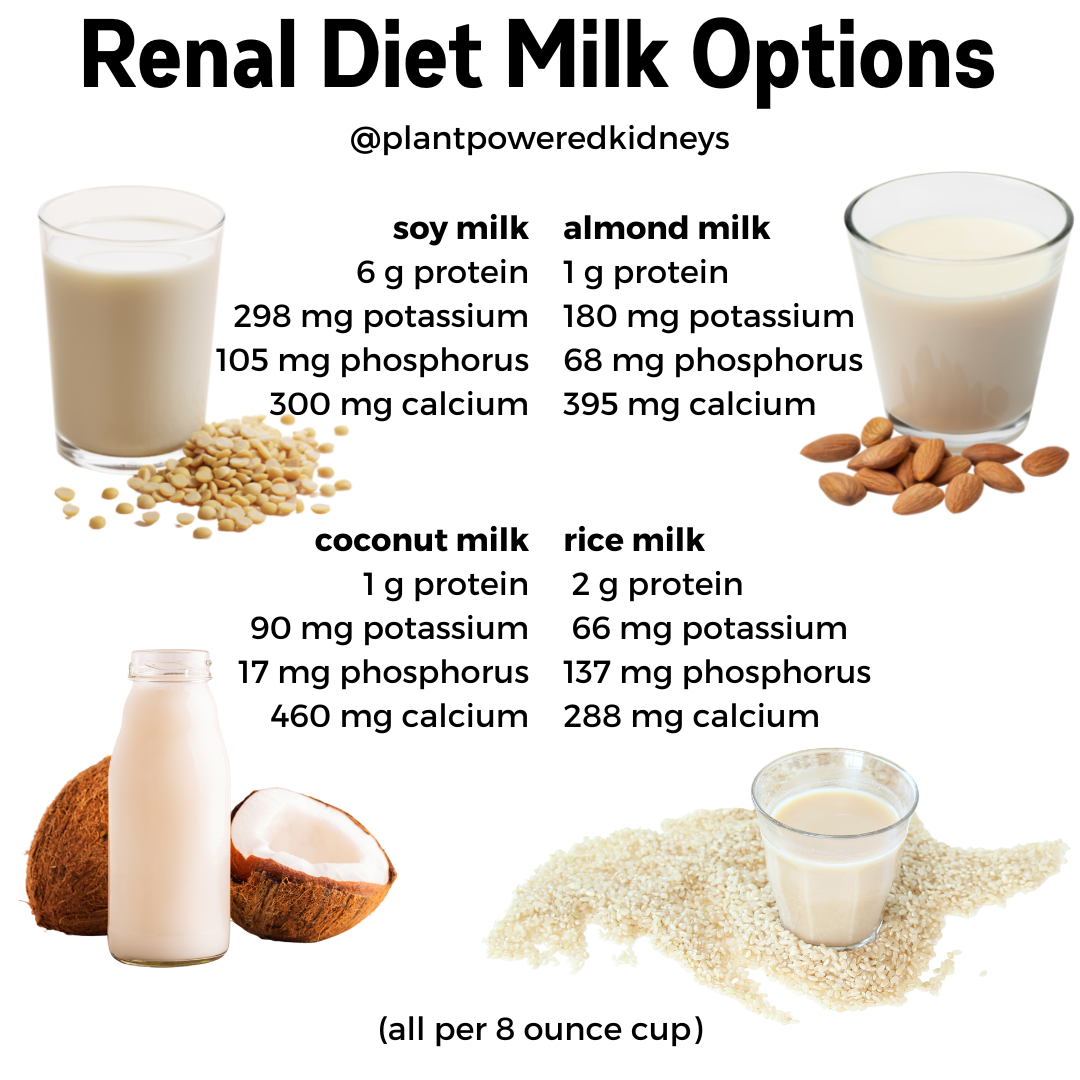
Baking Powder Swap
Try out this kidney-friendly baking swap to reduce the amount of phosphates in your baked good!
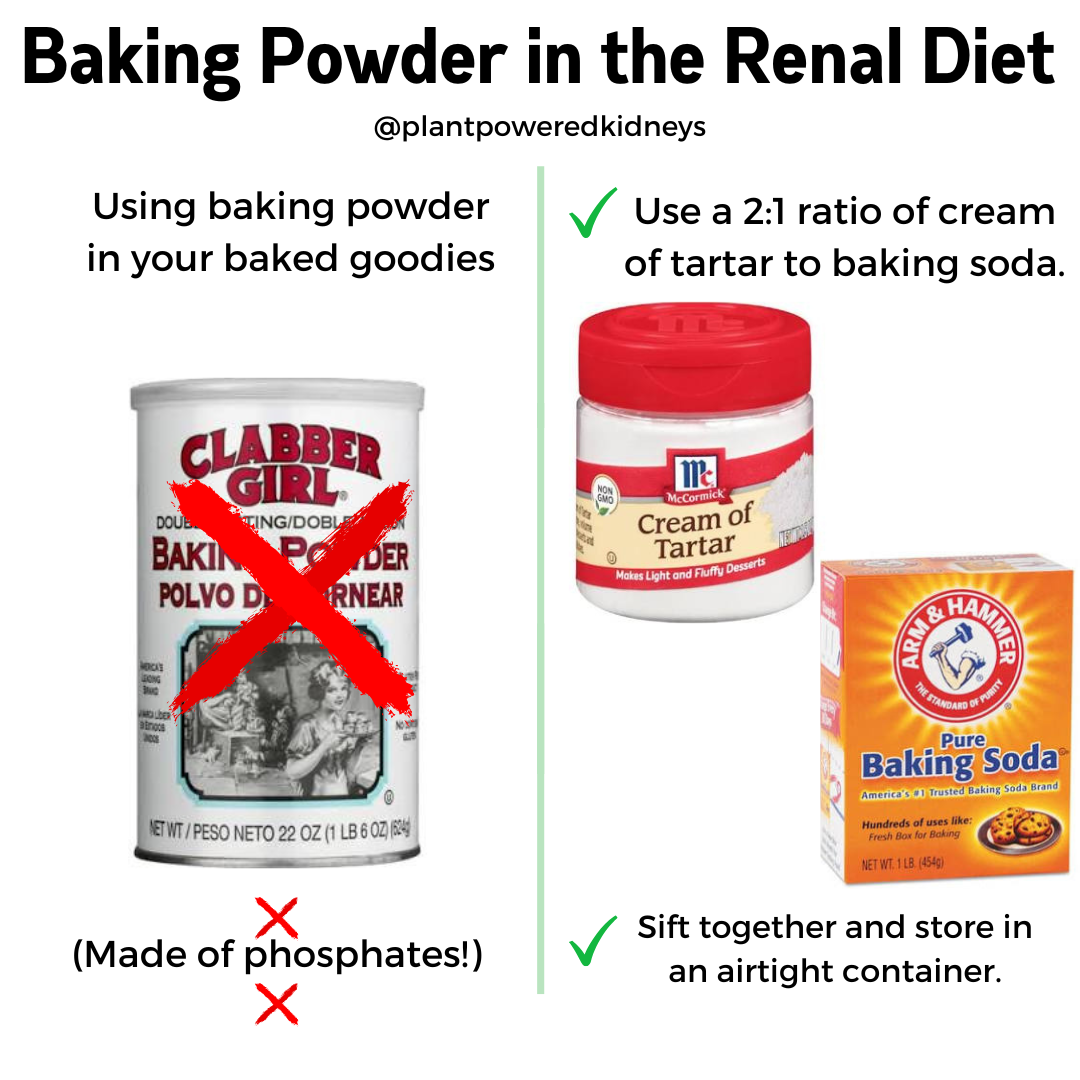
Best Gluten-Free Flour for Kidney Disease
There are some people that have kidney disease that also need to follow a gluten-free diet.
If you do need to follow a gluten-free diet (not every does), then there are certainly flours that you can include in your diet.
However, many gluten-free flour options are also helpful for those that are following a low-protein diet. (More on that topic here.)
Some of our favorites include:
- Chickpea flour **higher in phosphorus and potassium
- Oat flour (be sure to check individual labels to ensure that it is gluten-free)
- Brown Rice flour

Summary
Grab a mixing bowl and a whisk because there is a ton of kidney-friendly baking to be done this holiday season!
And the best way to ensure that you are baking in a kidney-friendly way is to pick the right flour.
Some of our favorite choices include all-purpose flour, whole wheat flour, and brown rice flour.
Which kidney-friendly flour are you baking with this season? Let us know!
Happy baking, kidney warrior!


